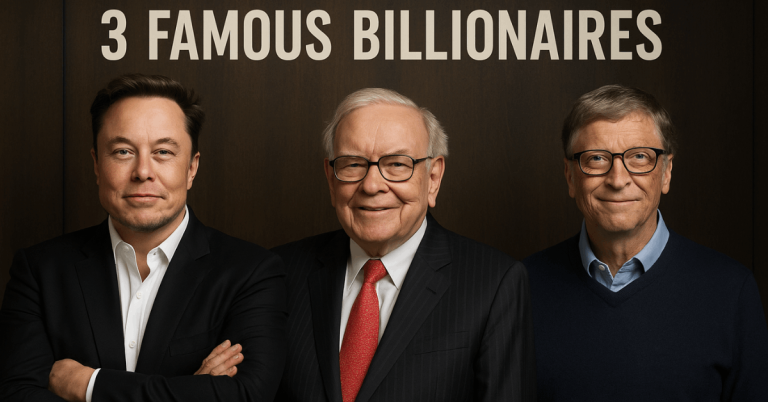Online business has changed the path to wealth for many people. Today, many millionaires who made their fortune online started with low budgets and basic tools.
You don’t need to be a tech expert to succeed. This article highlights ten individuals who built massive fortunes through the internet.
Shared Traits of Digital Millionaires
These online millionaires often share similar habits and choices. Many of them focused on solving real problems through digital platforms.
They also committed to learning fast and adjusting to user feedback. Consistency, simplicity, and timing played major roles in their rise.
Most of them also knew how to scale once their idea worked. You can apply many of their approaches to your own journey.

Online Millionaire Success Stories: 10 Digital Fortunes Built from Scratch
You can learn a lot from real people who built wealth through the internet. These millionaires who made their fortune online used content, e-commerce, apps, and digital tools to grow fast.
1. Jeffree Star – Beauty and Branding Online
Jeffree Star used MySpace and later YouTube to grow his personal brand. He launched a cosmetics company that quickly grew to eight-figure sales.
His success came from building a loyal fan base and launching products his audience wanted. Star invested heavily in online content and influencer strategies.
His brand, Jeffree Star Cosmetics, sells directly to consumers online. This approach created fast growth and high margins.
2. Michelle Phan – YouTube to Makeup Empire
Michelle Phan began uploading makeup tutorials on YouTube. She became one of the first beauty creators to reach massive success on the platform.
Phan co-founded EM Cosmetics and later helped launch Ipsy, a beauty subscription service. She focused on audience trust and authenticity.
Her early videos taught users while promoting affordable makeup. This helped build a dedicated audience that supported her business ventures.
3. Gary Vaynerchuk – Content and E-Commerce
Gary Vaynerchuk turned his family wine business into a digital success story. He launched Wine Library TV, building brand awareness through video content.
Later, he founded VaynerMedia, which offers digital marketing for top companies. Gary became known for his practical business advice online.
His fortune grew through brand deals, consulting, and early investments. He emphasizes patience, volume, and consistency online.
4. Markus Persson – Minecraft and Indie Games
Markus Persson, also known as Notch, created Minecraft from scratch. He released it online as a paid download and built a strong community around the game.
Minecraft became one of the most downloaded games of all time. Persson later sold the game to Microsoft for $2.5 billion.
He focused on simple mechanics, creative freedom, and constant updates. This helped Minecraft grow organically through word of mouth.
5. Sophia Amoruso – Vintage to Fashion Brand
Sophia Amoruso started selling vintage clothes on eBay. Her store, Nasty Gal, grew into a major online fashion brand.
She used product photography and edgy style to stand out. Amoruso later wrote a book and launched the Girlboss brand.
Her success showed how social media and niche fashion could drive huge online sales. She turned thrifted clothing into a multimillion-dollar business.
6. Pat Flynn – Passive Income from Blogging
Pat Flynn built his blog Smart Passive Income after being laid off. He shared his journey openly, including income reports and mistakes.
Flynn monetized through affiliate marketing, courses, and podcasts. His transparency helped him build trust with readers.
He focused on teaching others to earn online while building passive income streams. His model encourages ethical business practices and user-first thinking.
7. Daniel Ek – Spotify and Music Streaming
Daniel Ek launched Spotify to combat online music piracy. The platform offered streaming access to millions of songs legally.
Ek made money through subscriptions and partnerships. Spotify scaled rapidly across countries and devices.
Ek’s focus was user convenience and artist support. He showed how solving legal and user problems together can lead to online success.
8. PewDiePie – Gaming and YouTube Fame
PewDiePie, whose real name is Felix Kjellberg, built a YouTube empire. He became the most-subscribed solo creator for several years.
His content focused on video games, reactions, and humor. PewDiePie earned money from ads, sponsors, and merchandise.
He adapted to platform changes and stayed connected with fans. His journey highlights how personality and content consistency build long-term online income.
9. Melanie Perkins – Canva for Everyone
Melanie Perkins co-founded Canva, a simple graphic design platform. Her goal was to make design tools accessible to non-designers.
Canva used a freemium model, allowing users to upgrade for more features. It scaled through schools, businesses, and freelancers.
Perkins secured funding and focused on user growth. Canva became one of the top online design tools worldwide.
10. Richard Liu – JD.com and E-Commerce Expansion
Richard Liu launched JD.com as an online electronics store in China. He focused on fast delivery, reliable products, and strong logistics.
JD.com became a rival to Alibaba and other eCommerce platforms. Liu built internal infrastructure instead of relying on third parties.
This strategy helped him maintain control over customer service and quality. Today, JD.com is one of the top online retailers in Asia.
Common Online Business Models
Most of these millionaires used one or more of these models. These strategies remain useful for new entrepreneurs today.

- E-commerce platforms: Selling physical products through stores like Shopify or Amazon.
- Subscription services: Monthly deliveries, premium content, or exclusive access.
- Content monetization: Earning from YouTube ads, brand deals, and affiliate links.
- Software or apps: Building tools that solve a digital problem.
- Courses and coaching: Selling knowledge in the form of videos or PDFs.
Lessons You Can Apply
Each story offers practical advice you can use in your online journey. You don’t need millions to get started—just clarity and action.
- Start with what you know: Use your existing skills or passions.
- Stay consistent: Keep producing, updating, or improving.
- Focus on problems: Offer a clear solution that saves time or money.
- Build trust: Be transparent, honest, and helpful to your audience.
- Scale smart: When something works, expand it with care.
The Digital Path to Wealth Is Open
Many millionaires who made their fortune online began with nothing but ideas and access to the internet. You now have the same tools they used: social media, online platforms, and time.
What matters is how you use them to solve a real need. Learn from these stories, and start your own digital path today.





